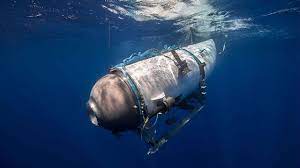

Why You’ll Be Paying for OceanGate
You know, I’ve heard a lot recently from Republicans suggesting that there is a two-tiered system of justice in this country. Oh, if they only knew the laughable irony their barely coherent ramblings represent given that they are referencing a man who should have already spent decades behind bars for stealing from his own charitable foundation, bilking innocent people of millions of dollars by creating a fake university, trying to influence election officials, and oh yeah, treasonously attempting to overthrow our democracy on the basis of entirely false claims of election malfeasance, all while normal Americans are habitually thrown in prison for minor offences, often with little legal protection or, even worse, tried, convicted and punished out in the streets, like George Floyd. But this is not an article about Donald Trump. No, I’ve written plenty about that bloated warthog, and he has already occupied far too much of our national spotlight. This column is not about the two-tiered justice system for one political party over another. This column is about the two-tiered justice system that actually exists: the one between wealthy and poor.
Sure, I could expound on thousands, nay millions, of discrepancies within the criminal justice system in how lower and middle class Americans are treated by the law as compared to those with the financial means to purchase high-priced lawyers who wield the influence to avoid convictions or seriously diminish sentences, but by now that should be low-hanging fruit. We should all be keenly aware of just how unjust our criminal justice system really is. But what I want to focus on this week is a far more subtle way that the American government favours the wealthy, a way that most of you have never even thought of. And it all comes down to the search and rescue mission for this past week’s catastrophe aboard an OceanGate submarine loaded with wealthy millionaires and billionaires.
Many of you have heard about that story and considered it a devastating tragedy, replete with the unfortunate circumstances of innocent victims. I do not. Perhaps, and by “perhaps” I mean “most definitely”, many of you will find me to be a callous asshole for this opinion, but I see this catastrophe through a somewhat different lens. What I see is a case of unmitigated hubris, a tragedy of epic proportions instigated by the reckless hankerings of jet set billionaires whose egos were the source of their own demise. Or as F. Scott Fitzgerald once said of Tom and Daisy Buchanan, the entitled catalysts of the unfortunate events that unfold through the course of the novel, ““They were careless people, Tom and Daisy- they smashed up things and creatures and then retreated back into their money or their vast carelessness or whatever it was that kept them together, and let other people clean up the mess they had made.”

I could focus on the phrase “careless” here, as anytime you operate a human-manned vehicle down to ocean depths far below the sustainability for human life with an actual video game controller, all in defiance of numerous whistleblower warnings from dedicated scientists about the incorporation of three different types of exterior materials, you should know that there’s a fairly sizeable danger that shit is going to hit the fan. Stockton Rush flouted regulations in building the vessel that eventually killed five, quoting Gen. McArthur by saying, “You’re remembered for the rules you break.” But what I want to hone in on from the Gatsby quote is the last part about other people having to clean up their mess, because this Jules Verne novel gone horribly wrong precipitated a Coast Guard search and rescue that is estimated to cost into the millions. And would you like to guess who is going to foot the bill for those Herculean, but inevitably futile, efforts? Trust me- you don’t because it isn’t the estates of the deceased who each had enough chump change to fork over $250k for the privilege of riding on this doomed paperweight all so they could get a glimpse of the Heart of the Ocean and Jack’s corpse, presumably still clinging to that door that he definitely could have fit on if not for that pushy, door-hogging Rose. No, as you probably already presumed, you and I will be shouldering the burden of those expenses in the form of federal taxes that fund the Coast Guard budget. And that should make you mad as hell because I’m not sure you would be treated to the same.
As a matter of policy, the Coast Guard never recovers money for search and rescue missions, regardless of how egregious the known risks associated with the expedition were or the financial circumstances of the people involved. But how many poor people do you know that own boats? Not many. Boats, on average, run about $30k. They are, in most cases, a luxury item. So let me get this straight- these folks have enough money to afford a $30k toy, but not enough to pay for the accidents they get into with them?
Meanwhile, anyone can go hiking. All you need is a pair of hiking boots and a heart full of adventure to walk out your door and experience the beauty of nature. But hold on just a second there, hippie boy! Many states charge you for search and rescue missions that occur on state lands. People who have gotten stranded or cliffed out while wandering off trail have been handed search and rescue operations bills for thousands and thousand of dollars. Why the double standard? Well, let’s just say that whatever the justification may be, that like the OceanGate sub, it doesn’t hold water.
Steven Craig is the author of the best-selling novel WAITING FOR TODAY, as well as numerous published poems, short stories, and dramatic works. Read his blog TRUTH: In 1000 Words or Less every THURSDAY at www.waitingfortoday.com




